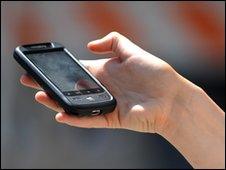Who pays the bill if you lose your phone?
- Published

Bills run up by thieves can be enormous
Who pays the bill if you lose your phone?
If you pay for your calls on a contract and you do not report the loss immediately, the phone company can hold you liable for a bill of hundreds or even thousands of pounds.
It is estimated that tens of thousands of mobiles are lost or stolen every year, and whilst some people constantly use their phone and would notice any loss very quickly, other people may have one only for emergencies or to use occasionally.
Anthea Guthrie only uses her mobile from time to time, so when her phone went missing she did not notice for several days, as she told Radio 4's Money Box programme.
"I believe it probably went missing during a visit to Bristol, that must have been on the Saturday. I realised it was lost on the Monday and rang T-Mobile," she says.
T-Mobile sent her a replacement phone and SIM card and she did not think much more about the old phone until she received a text from T-Mobile estimating her monthly bill.
Instead of her normal monthly charge of about £20 she was told her bill for that month would be almost £1500.
Eyebrow raising
When she phoned T- Mobile, she discovered that numerous calls had been made on her phone from the UK to countries including Afghanistan, Pakistan and Iran in the time between when the mobile was stolen and when she realised it had gone and alerted her network.
Anthea was shocked that so many expensive calls could have been made on her phone without T-Mobile cutting her off or at least verifying she was in possession of her phone.
She says call centre staff at T- Mobile told her the credit limit on her account had also been raised allowing the call costs to rack up.
Anthea says she was shocked when she discovered that even the lower credit limit was £550, given how little she used her phone.
"What were they doing setting a credit limit of £550 on someone who consistently only ever pays about £20 a month?" she says.
"Why didn't someone lift an eyebrow when they noticed that all those calls had been made to £550 in a day?"
Not told
T-Mobile told Anthea because the calls were made before the phone was reported lost it was under no contractual obligation to waive the charges.
Anthea refused to pay and so T-Mobile passed the outstanding amount to a debt recovery firm.
When Money Box initially contacted T-Mobile the firm said whilst it monitors calls for fraud, customer use can vary considerably and it cannot suspend an account without good reason.
It reiterated it could not be held accountable for usage charges whilst a phone had been stolen if the firm had not been informed.
It denied it had raised Anthea's limit and refused even to say what the limit was.
It was also unclear whether having a credit limit would have resulted in the phone being cut off, as T-Mobile says its charges are not capped by the credit limit.
The major mobile networks all say they monitor fraud and attempt to contact customers if they see suspicious patterns.
However they say that the ultimate responsibility for calls made before a phone is reported lost or missing is with the customer.
The limits
The main networks have different policies regarding credit limits, which in some cases could effectively reduce a customer's liability to the sort of fraudulent calls made on Anthea's account.
Mobile firm '3' says a typical credit limit on one of its contracts is £100 and if a customer exceeds that he or she will be asked to verify who they are or risk being cut off.
Virgin has a similar policy.
02 and Vodafone do not use credit limits at all and Orange says it does not cap calls.
Veena Kanda is director for business development at the dispute resolution service IDRS, which administers the Communications and Internet Services Adjudication Scheme (CISAS), one of the two adjudication schemes for mobile phone customer complaints.
She believes the mobile phone industry should do more to alert customers to this potential liability.
"Mobile companies could certainly give clearer messages about what the cap really means," she said.
"It doesn't mean they will cut off calls as soon as you have reached that cap, however low or high it is. It's not a security tool for the customer," she added.
After initially refusing to waive Anthea's charges, T-Mobile told Money Box it was prepared to do this having re-examined the pattern of Anthea's phone calls.
It accepted that she had not made the calls to Iran, Pakistan and elsewhere and so it would not be holding her liable.
However it is unclear whether other customers of T-Mobile or other networks in a similar predicament in future will or will not be charged.
The phone industry says in order to stop fraud, customers should use the Pin security on their phones or ask their provider not to allow foreign calls from their handset.
BBC Radio 4's Money Box is broadcast on Saturdays at 1200 BST and repeated on Sundays at 2100 BST.